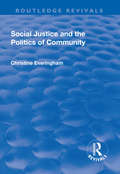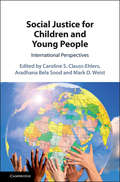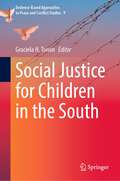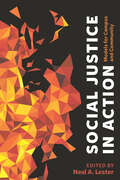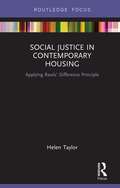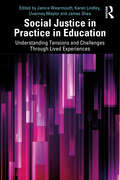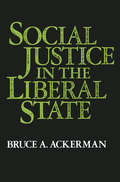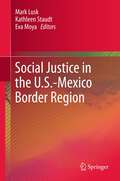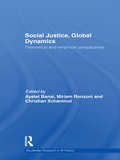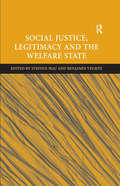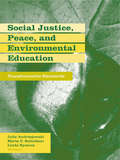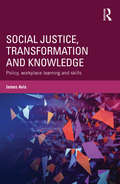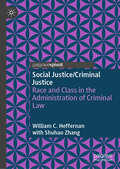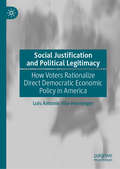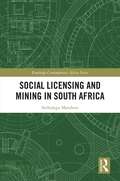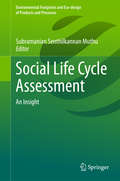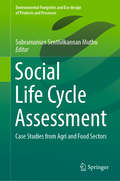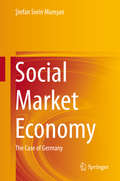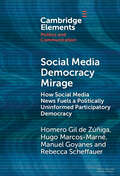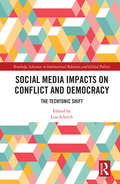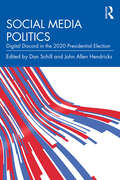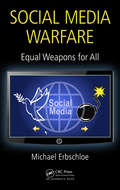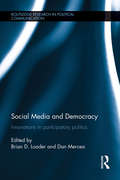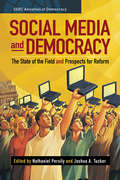- Table View
- List View
Social Justice and the Politics of Community (Welfare And Society Ser.)
by Christine EveringhamThis title was first published in 2003. Social welfare is the focus of much discussion and there is a broad spectrum of political opinion that agrees on the need for urgent reform. The literature informing these policy debates draws on a diversity of theoretical traditions and discourses concerned with remaking community, yet there has been no in-depth, coherent political analysis of these various positions. This captivating volume provides such an analysis, enabling the diverse discourses informing current social policy debates to be identified and understood in broader perspective. The book frames the debates within the context of globalization and the accompanying shift in focus of social policy from issues of social justice to questions of social order. It identifies 'the community' as both the site of today's social problems and the main tool that governments have at their disposal to address these problems. This portrayal of 'the community' is both theorized and illustrated with empirical material drawn from the Australian experience of community action.
Social Justice for Children and Young People: International Perspectives
by Mark D. Weist Clauss-Ehlers, Caroline S. Aradhana Bela SoodAccording to the Convention on the Rights of the Child, the goal of a social justice approach for children is to ensure that children “are better served and protected by justice systems, including the security and social welfare sectors.” Despite this worthy goal, the UN documents how children are rarely viewed as stakeholders in justice rules of law; child justice issues are often dealt with separate from larger justice and security issues; and when justice issues for children are addressed, it is often through a siloed, rather than a comprehensive approach. This volume actively challenges the current youth social justice paradigm through terminology and new approaches that place children and young people front and center in the social justice conversation. Through international consideration, children and young people worldwide are incorporated into the social justice conversation.
Social Justice for Children in the South (Evidence-Based Approaches to Peace and Conflict Studies #9)
by Graciela H. TononThis book considers that contextual factors are important for the achievement of social justice and it recognizes that vulnerability to which children are exposed is a phenomenon throughout the planet, particularly in the South. It presents a theoretical review of social justice as well as different situations of vulnerability children experience in their daily lives in which they can be injured, affecting their well-being and the exercise of their rights. It examines the impact of the COVID-19 pandemic on children, considered as a vulnerable group warranting special social policy considerations. It also presents the need to change power structures in knowledge production and decision-making processes to achieve social justice for children; the importance of investing in children; the exclusion of children from participation in certain activities and the shame of not being able to participate in equal conditions with others; the lives of migrant children belonging to ethnic minorities exposed to language barriers and access to technological devices; and the analysis of the process of social re-integration of children from conditions of armed conflict. The book concludes that governments need to assume social justice as part of universal human interests, providing security, conditions for well-being, and guaranteeing social justice for all children.
Social Justice in Action: Models for Campus and Community
by Neal A. LesterAddressing both veterans of justice work and novices seeking points of entry, the essays in this volume showcase practical approaches to diversity, equity, and inclusion: ways to build community, earn trust, tell unheard stories, and develop solutions to problems. Emphasizing values such as empathy, self-reflection, and integrity, the volume is rooted in humanities work but also features contributions from fields as diverse as the performing arts, architecture, and evolutionary biology and represents settings beyond the college campus, such as schools, libraries, museums, and prisons. While bringing insights from higher education, it critiques the system as well, exploring the ways that institutions reinforce power structures and exclude marginalized voices. Interspersed with the essays, brief reflections by activists and artists offer testimony and inspiration.
Social Justice in Contemporary Housing: Applying Rawls’ Difference Principle (Routledge Focus on Housing and Philosophy)
by Helen TaylorPhilosophy is not usually seen as a guidance for modern housing policy, but in this new book, Dr Helen Taylor argues that there is something innovative, unusual, and worth discussing about the application of philosophy to housing. The philosophical framework used within this book is John Rawls’ conception of justice as fairness. The UK has gone through several shifts in housing policy over the past decade, most recently by introducing the controversial ‘Bedroom Tax’, in an effort to make more cuts to benefits and social welfare. Social Justice in Contemporary Housing: Applying Rawls’ Difference Principle suggests that by using ideas of agency we can understand the impact that social policy has on individuals and wider society. The work outlines the liberal principle of legitimacy and argues that Rawls’ concept of reasonableness can, and should, be used to justify the intervention of policy in individuals’ lives. This book will be of interest to undergraduate and postgraduate students of housing as well as philosophy and social policy, and also those working around the creation and implementation of social housing in the UK.
Social Justice in Practice in Education: Understanding Tensions and Challenges Through Lived Experiences
by Janice Wearmouth James Shea Uvanney Maylor Karen LindleyExploring Social Justice in Practice in Education focuses on the tensions and challenges to issues of fairness and social and cognitive justice in the sphere of education. The terms ‘fairness’ and ‘social and cognitive justice’ are often used to justify particular policies and practices in the sphere of education. In providing a clear definition of what they should mean in practice, this book includes a discussion of, and, in some cases, potential resolutions to, tensions and challenges in relation to notions of fairness, and social and cognitive justice that are implicit within individuals’ lived experiences across all phases of education. Through their personal narratives, the authors illustrate how such tensions and challenges have played out in their own lives. They go on to explore differences in interpretations and consequent challenges in putting concepts of social justice into practice. Chapters consider important implications across different sectors and phases of education, including special educational needs, leadership and higher education. This insightful volume will enable educators, at all levels, to hear from students, family members, significant adults/carers and professionals, their experiences of fairness and social justice in education, and about what could be done in the future to redress injustices. It will appeal to readers at all levels in education including those studying for or teaching Education-related degrees at bachelors’, masters’ and doctoral levels.
Social Justice in the Liberal State
by Bruce AckermanCertain to become the most important work in political theory since John Rawls's A Theory of Justice, this book presents a brilliantly original, compelling vision of a just society-a world in which each of us may live his own life in his own way without denying the same right to others. Full of provocative discussions of issues ranging from education to abortion, it makes fascinating reading for anyone concerned with the future of the liberal democratic state.
Social Justice in the U.S.-Mexico Border Region
by Kathleen Staudt Eva Moya Mark LuskThe U.S.-Mexico Border Region is among the poorest geographical areas in the United States. The region has been long characterized by dual development, poor infrastructure, weak schools, health disparities and low-wage employment. More recently, the region has been affected by the violence associated with a drug and crime war in Mexico. The premise of this book is that the U.S.-Mexico Border Region is subject to systematic oppression and that the so-called social pathologies that we see in the region are by-products of social and economic injustice in the form of labor exploitation, environmental racism, immigration militarism, institutional sexism and discrimination, health inequities, a political economy based on low-wage labor, and the globalization of labor and capital. The chapters address a variety of examples of injustice in the areas of environment, health disparity, migration unemployment, citizenship, women and gender violence, mental health, and drug violence. The book proposes a pathway to development.
Social Justice through Citizenship?
by Aleksandra LewickiLewicki examines how current salient discourses of citizenship conceptualize democratic relations and frame the 'Muslim question' in Germany and Great Britain. Citizenship is understood not as a static or monolithic regime, but as being reproduced through competing discourses that can facilitate or inhibit the reduction of structural inequalities.
Social Justice, Global Dynamics: Theoretical and Empirical Perspectives (Routledge Research in International Relations Theory)
by Ayelet Banai Miriam Ronzoni Christian SchemmelMany theoretical publications make assumptions about the facts of globalization, and in particular about the role and autonomy of the nation state. These factual claims and assumptions often play an important role in justifying the normative conclusions, yet remain under-explored. This interdisciplinary volume examines questions that are central to the problems of both social and international justice, and in particular, to their interdependence: How do global and transnational factors influence the capacity of states to be internally just? Has the state lost its capacity for autonomous action in the global economy, and thus its ethical significance for theories of justice? If so, which institutional reforms could address this problem? What is the role of the state in a just international order? The authors address important connections between domestic social justice and global dynamics, by identifying problematic practices and trends in the current global order. They examine political, economic and legal changes and offer normative views on concrete policies and institutions that are particularly important and/or problematic – i.e. international health policies, the World Bank, taxation policies and the World Trade Organization. Focusing on the relationship between social and global justice and establishing connections between political theory and empirical research, this book is vital reading for students and scholars of Politics, International Relations, and Development Studies.
Social Justice, Legitimacy and the Welfare State
by Benjamin VeghteDrawing together leading international experts such as Knut Halvorsen, Robert Y. Shapiro, Stefan Svallfors and Wim van Oorschot, this volume addresses issues of justice and legitimacy in the context of welfare state transformation. The contributors demonstrate that the Western welfare state is not at risk of losing support or encountering fundamental opposition, but does face serious challenges including growing social and ethnic diversity, new social risks, fiscal constraints and contested notions of justice. The volume focuses on four main aspects: attitude formation in cross-national perspective, the just distribution of burdens and benefits, political factors mediating the effects of social attitudes on public policy and challenges to the welfare state stemming from immigration and ethnic diversity. Providing a comparative perspective on the issue, Social Justice, Legitimacy and the Welfare State makes a significant contribution to the literature on the public standing of the welfare state.
Social Justice, Peace, and Environmental Education: Transformative Standards (Teaching/Learning Social Justice)
by Julie Andrzejewski Marta P. Baltodano Linda SymcoxThe concept of "standards" seems antithetical to the ways critical educators are dedicated to teaching, but what would "standards" look like if they were generated from social justice perspectives and through collaborative and inclusive processes? Such is the central question posed by the contributors of this groundbreaking collection on the interconnectivity of social justice, peace, and environmental preservation. Challenging education that promotes consumerism, careerism, and corporate profiteering, they boldly offer examples of a new paradigm for practicing a transformative critical pedagogy. Rather than just talking about coalition building within and across educational communities, they demonstrate how we might communicate from different vantage points and disciplinary boundaries to create a broader picture of social and eco-justice. Social Justice, Peace, and Environmental Education will be required reading for educators and students who want to envision and practice living, acting, and teaching for a better world.
Social Justice, Transformation and Knowledge: Policy, Workplace Learning and Skills
by James AvisSocial Justice, Transformation and Knowledge: Policy, Workplace Learning and Skills examines the policy contexts in which lifelong learning, vocational education and training and skill development is set. It provides a critique of neo-liberalism and its impact on vocational education and training and lifelong learning. It interrogates potentially progressive policy interventions that take for granted capitalist relations as these can become a form of ‘comfort radicalism’ that whilst calling for structural change remain lodged within capitalism. Such analyses are limited, particularly in austere conditions of worklessness with increasing numbers of workers surplus to the requirements of capital. Offering detailed discussions within UK, European and global contexts, this book proves an insightful and critical text which illustrates Professor Avis’ extensive experience and knowledge of the field. Adopting a substantive focus on debates and analysis with significance that extends beyond the particular policy context of England, the book offers: an exploration of arguments that suggest workplace learning carries with it progressive possibilities an examination of models of class implicit within education policy and documents consideration of forms of governance and professionalism and their articulation to the pursuit of social justice an insight into discussions concerned with social justice, knowledge as well as the current conditions of austerity in which education and social policy are emphasised Social Justice, Transformation and Knowledge is a significant addition to the field. It is an insightful and thought-provoking book from which students, lecturers and researchers with an interest in education studies, education policy, and social justice will greatly benefit from reading.
Social Justice/Criminal Justice: Race and Class in the Administration of Criminal Law
by William C. HeffernanThis book builds on Heffernan's last book Rights and Wrongs: Rethinking the Foundations of Criminal Justice by examining the class and racial disparities at the heart of current law — disparities that, according to many, generate a system of criminal injustice. It argues that these disparities run throughout the legal system; they’re present in policing, corrections, and sentencing. It discusses the relationship between the two kinds of justice — social justice and criminal justice and how to ensure fairness in state-imposed punishment. It theorises the extent to which criminal law must address considerations of social justice to ensure a fair system. It proposes a framework for analyzing disparities, provides an overview of contemporary research concerning them, and offers reform proposals for addressing them. Written in an accessible way, it introduces readers to philosophical theory and doctrines in constitutional law and thus it speaks to a wide audience concerned about racial and class disparities in the criminal justice system. It responds to a half-century’s worth of public concern about the legitimacy of the state’s exercise of its penal power while explaining the pertinence of social justice principles to the criminal justice system.
Social Justification and Political Legitimacy: How Voters Rationalize Direct Democratic Economic Policy in America
by Luis Antonio Vila-HenningerThis volume explores voters’ political rationalizations. The author analyzes semi-structured interview data from 120 American voters collected from 2013-2015 about their positions on three economic referenda—or “direct democratic economic policies” (DDEPs) on the Arizona state ballot from 2008-2012. Building on the literature on voter reasoning and rationalization, the author firstly probes how the intersection of economic position and partisan affiliation shape partisan voters’ rationalizations of their DDEP positions. Secondly, he investigates the political and economic discourses that voters use to justify their DDEP positions. This book extends classic sociological theories of individual-level and collective legitimacy, along with contemporary theories of voter rationalization. The findings also help to build theories of American political ideology and values, neoliberalism, moral economy, and norms of self-interest.
Social Licensing and Mining in South Africa (Routledge Contemporary Africa)
by Sethulego MatebesiThis book highlights the role of community trusts in social licencing through the lens of mining and mining disputes in South Africa. Employing elements of trust, acceptance and elite interaction as a framework, this book critically investigates the underlying dynamics of community development trusts and also the response of host communities to the inherent dilemma of the SLO concept, namely social legitimation versus corporate profits. Looking at formal versus informal regulatory requirements, popular mobilisation, and the interaction between the local population and mining companies, this book constitutes a thorough look at the issues surrounding mining in South Africa and its effect on society. This book will be of interest to students and scholars of African studies, business in Africa, corporate responsibility, and development studies.
Social Life Cycle Assessment
by Subramanian Senthilkannan MuthuThis book details the primary concepts of Social Life Cycle Assessment (S-LCA), integration of social aspects in product life cycles, quantification of social impacts in S-LCA, impact categorization in S-LCA, methodological aspects of S-LCA, and detailed case studies. As the societal implications of producing a product are coming to take on a new importance, the concept of Social Life Cycle Assessment has recently been developed and is becoming increasingly prominent. However, S-LCA is still in its infancy and its impact categories for many industrial segments are still under development.
Social Life Cycle Assessment: Case Studies from Agri and Food Sectors (Environmental Footprints and Eco-design of Products and Processes)
by Subramanian Senthilkannan MuthuThis book highlights the Social Life Cycle Assessment (SLCA) of the agri-sector for rice, sugarcane, and cassava in Thailand and the food sector. It also presents a range of models, indices, impact categories, etc. for SLCA that are currently being developed for industrial applications. Though SLCA was introduced in 2010, it is still relatively new compared to environmental life cycle assessment (ELCA).
Social Market Economy
by Stefan Sorin MuresanThe book presents the economic policy model known as "Social Market Economy" in Germany, the country where it originated. Although the model has since been adopted as core objective in the EU Treaty of Lisbon, experts still disagree on its exact nature. The author contributes to this debate by presenting the German economic system from an external perspective and looking at the extent to which it enabled the country increase its weight in international relations. The system´s history, identity, political and economic concepts, including ordoliberalism, are analyzed. Its potential and shortcomings are assessed by comparing it to other forms of capitalism. A brief enquiry is made into whether the "Social Market Economy", or aspects of it, are applicable to other countries, including in Eastern Europe. Providing both theoretical and practical aspects, the book offers a valuable resource for researchers, public administration professionals, and policymakers.
Social Media Democracy Mirage: How Social Media News Fuels a Politically Uninformed Participatory Democracy (Elements in Politics and Communication)
by Homero Gil de Zúñiga Hugo Marcos Marné Manuel Goyanes Rebecca ScheffauerFor over two decades, political communication research has hailed the potentially reinvigorating effect of social media on democracy. Social media was expected to provide new opportunities for people to learn about politics and public affairs, and to participate politically. Building on two systematic literature reviews on social media, and its effects on political participation and knowledge (2000–2020), and introducing empirical evidence drawing on four original US survey data that expands for over a decade (2009–2020), this Element contends that social media has only partially fulfilled this tenet, producing a Social Media Democracy Mirage. That is, social media have led to a socio-political paradox in which people are more participatory than ever, yet not necessarily more informed.
Social Media Impacts on Conflict and Democracy: The Techtonic Shift (Routledge Advances in International Relations and Global Politics)
by Lisa SchirchSocial media technology is having a dramatic impact on social and political dynamics around the world. The contributors to this book document and illustrate this "techtonic" shift on violent conflict and democratic processes. They present vivid examples and case studies from countries in Africa, South and Southeast Asia, Latin America as well as Northern Ireland. Each author maps an array of peacebuilding solutions to social media threats, including coordinated action by civil society, governments and tech companies to protect human minds, relationships and institutions. Solutions presented include inoculating society with a new digital literacy agenda, designing technology for positive social impacts, and regulating technology to prohibit the worst behaviours. A must-read both for political scientists and policymakers trying to understand the impact of social media, and media studies scholars looking for a global perspective.
Social Media Politics: Digital Discord in the 2020 Presidential Election
by John Allen Hendricks Dan SchillSocial media and social networking services are integrated into the American political process and have profoundly influenced political communication and participation. Social media platforms have transformed the political landscape by revolutionizing information dissemination, citizen engagement, and public opinion formation and change. Politicians use social media to communicate directly with voters in an unmediated and unfiltered manner. Comparatively, voters use social media to follow the latest messaging from politicians accompanied by demonstrating their support for particular politicians. This book is a comprehensive examination of the role of digital and social media in the 2020 U.S. presidential election. Political discourse during the 2020 election revealed political disharmony and a deep political division among vast swaths of Americans that was powered, in part, by social media. This book reveals how digital and social media have reshaped power dynamics by altering the relationships among citizens, politicians, and traditional media outlets, the emergence of new influencers, and the impact of online activism on policy agendas.This book, Social Media Politics, includes scholars with varied backgrounds and experience, using both quantitative and qualitative methodologies, from leading research institutions around the nation. Students, scholars, and practitioners will gain new knowledge to more clearly understand the role social media played in the 2020 presidential campaign.
Social Media Warfare: Equal Weapons for All
by Michael ErbschloeSocial media applications can be weaponized with very little skill. Social media warfare has become a burden that nation states, government agencies, and corporations need to face. To address the social media warfare threat in a reasonable manner that reduces uncertainty requires dedication and attention over a very long-term. To stay secure, they need to develop the capability to defend against social media warfare attacks. Addressing unconventional warfare strategies and tactics takes time and experience, plus planning and dedication. This book will help managers develop a sound understanding of how social media warfare can impact their nation or their organization.
Social Media and Democracy: Innovations in Participatory Politics (Routledge Research in Political Communication)
by Dan Mercea Brian D. LoaderThis book critically investigates the complex interaction between social media and contemporary democratic politics, and provides a grounded analysis of the emerging importance of Social media in civic engagement. Social media applications such as Facebook, Twitter, and YouTube, have increasingly been adopted by politicians, political activists and social movements as a means to engage, organize and communicate with citizens worldwide. Drawing on Obama’s Presidential campaign, opposition and protests in the Arab states, and the mobilization of support for campaigns against tuition fee increases and the UK Uncut demonstrations, this book presents evidence-based research and analysis. Renowned international scholars examine the salience of the network as a metaphor for understanding our social world, but also the centrality of the Internet in civic and political networks. Whilst acknowledging the power of social media, the contributors question the claim it is a utopian tool of democracy, and suggests a cautious approach to facilitate more participative democracy is necessary. Providing the most up-to-date analysis of social media, citizenship and democracy, Social Media and Democracy will be of strong interest to students and scholars of Political Science, Social Policy, Sociology, Communication Studies, Computing and Information and Communications Technologies.
Social Media and Democracy: The State of the Field, Prospects for Reform (SSRC Anxieties of Democracy)
by Nathaniel Persily Joshua A. TuckerOver the last five years, widespread concern about the effects of social media on democracy has led to an explosion in research from different disciplines and corners of academia. This book is the first of its kind to take stock of this emerging multi-disciplinary field by synthesizing what we know, identifying what we do not know and obstacles to future research, and charting a course for the future inquiry. Chapters by leading scholars cover major topics – from disinformation to hate speech to political advertising – and situate recent developments in the context of key policy questions. In addition, the book canvasses existing reform proposals in order to address widely perceived threats that social media poses to democracy. This title is also available as Open Access on Cambridge Core.
